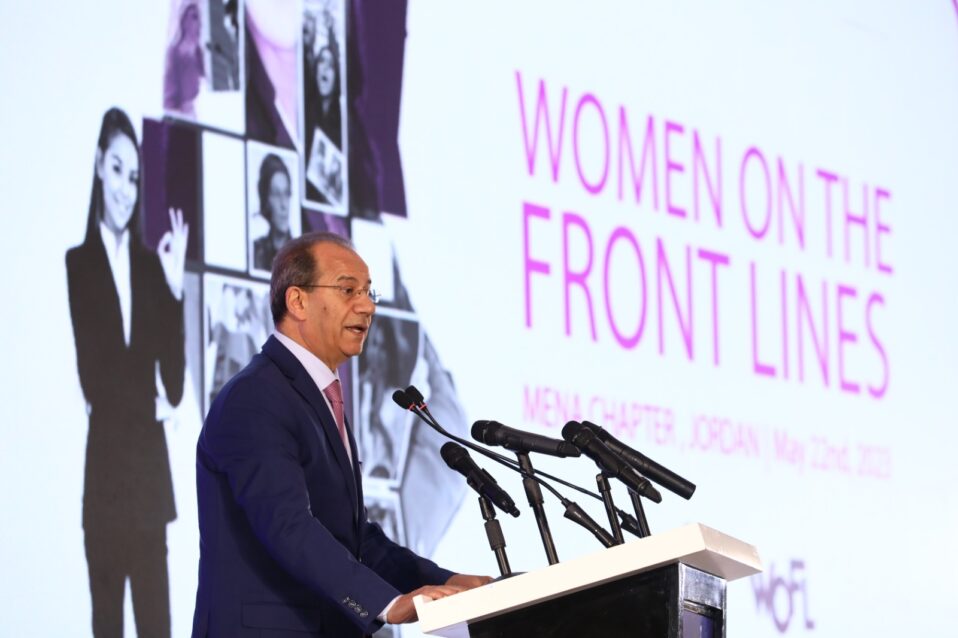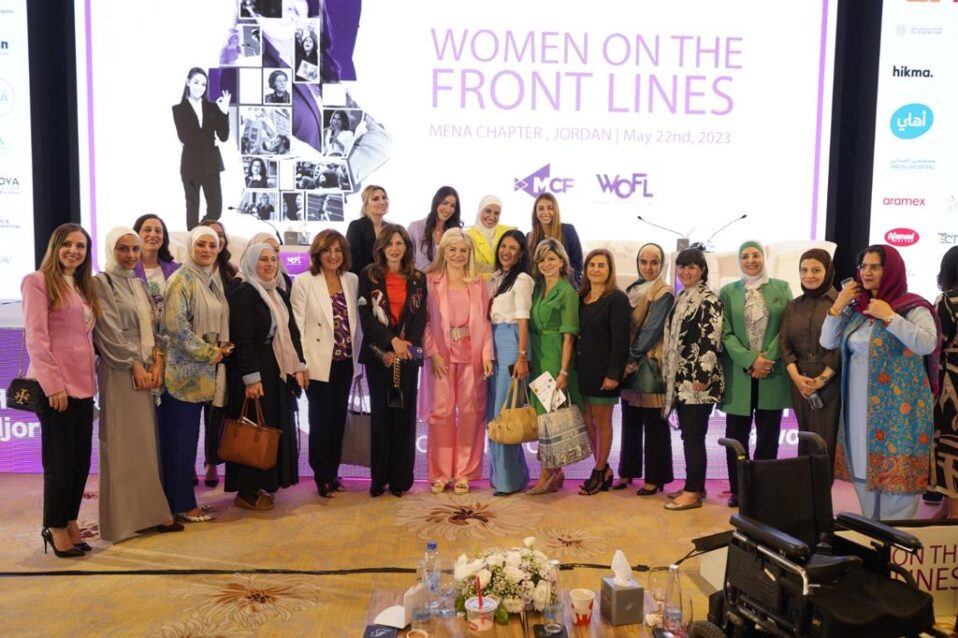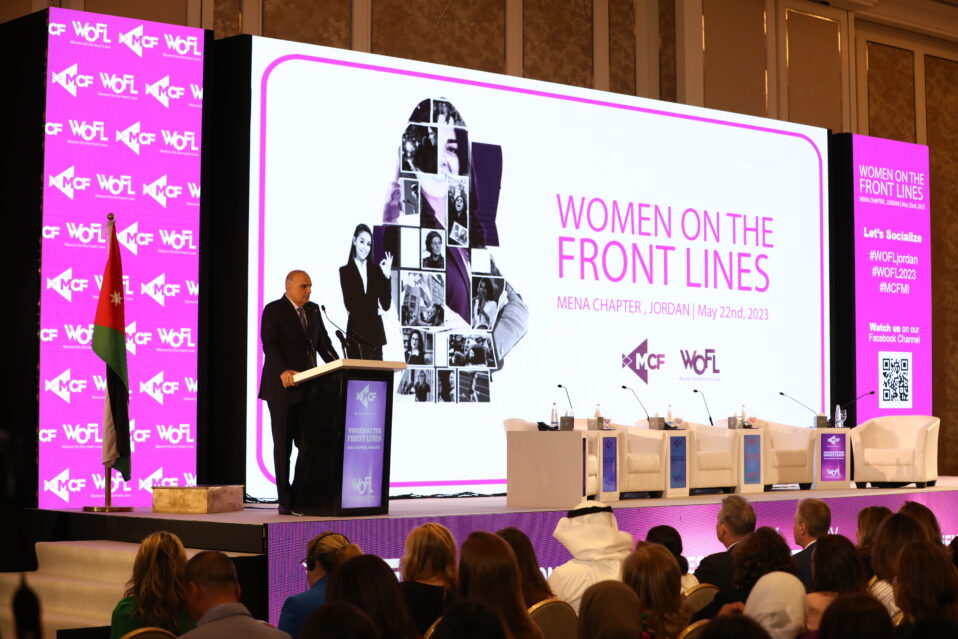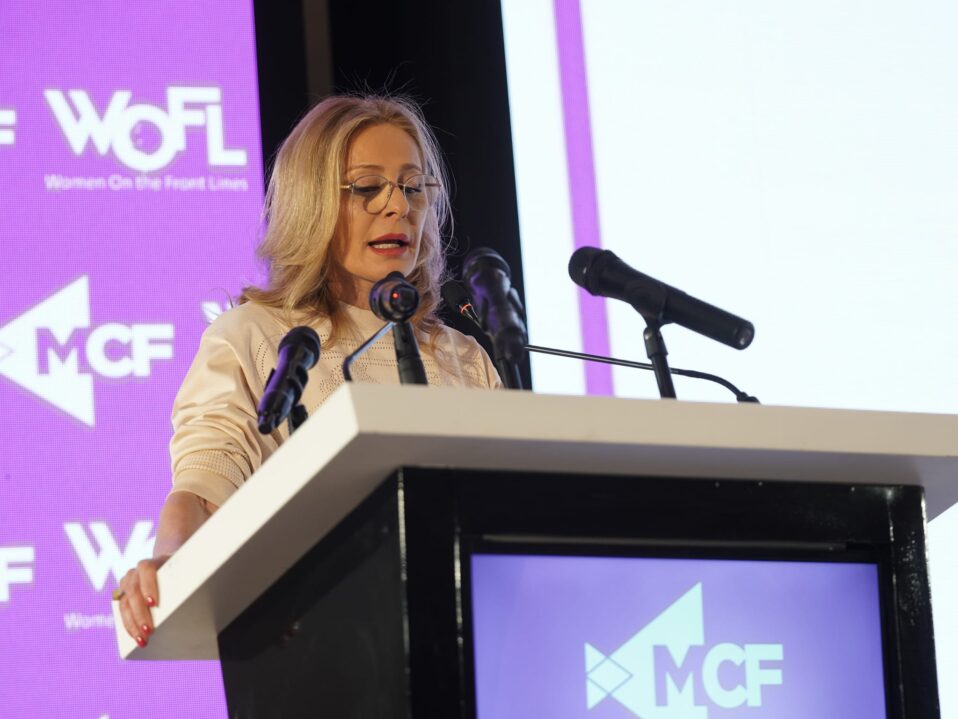I would like to say a word stemming from the heart before I start with the official text.
First of all, the presence of His Excellency, the Jordanian Prime Minister, Dr. Bishr Al-Khasawneh, who prioritized us today with his presence and the speech he gave during this occasion, is a great honor to us.
Of course, we also welcome the representative of the Prime Minister, who will also give a speech in a bit, Minister of Government Communications Mr. Faisal Shuboul.
I welcome all friends, ambassadors, ministers, and Minister Manqoush who is the first Foreign Affairs Minister in Libya. I do not know whom else to welcome, but allow me to shed light on my friend Celine Abou Ghazale because a few days ago we were mourning the loss of her father, and yet, she insisted to be here today at the Conference since it is dear to her. I found this so touching, and I know how much this conference has become dear to both Jordanian and Lebanese hearts as well as the hearts of all participants from various regions.
I would also like to welcome Their Royal Highnesses the Princesses, Princess Basma, who will be participating with us in one of the panels, and HRH Princess Dina, whose presence is also very dear to us today.
I don’t want to be excluding anyone. There are also diplomats, Lebanon’s ambassador, and the Kuwaiti Charge D’affaires. I know there are many present here, I’m sorry if I cannot name everyone, but from my heart, my joy today is indescribable with my return to my second home, Jordan.
His Excellency the Jordanian Prime Minister Dr. Bisher Al Khasawneh, the representative of the Hashemite Government, Mr. Faisal Shuboul Minister of Government Communications.
Your Excellencies and Distinguished Guests,
Members of the Diplomatic field and Political, Economic, and Media Corps, and Security Entities,
Representatives of Civil Society and Women’s Organizations,
Dear friends, honorable attendees,
With great joy and indescribable excitement, we gather once again in Amman, where five previous conferences of “Women on the Front Line – MENA Chapter” provided a platform for inspiring women from the Arab region and the world. It is true that the pandemic forced our absence for two years in 2020 and 2021. However, our return last year, with the encouragement of friends in Jordan, who are strong supporters of women’s issues and rights, was much stronger. This has made this event a prestigious and highly anticipated milestone on the agenda of women’s events and activities.
It is a great honor today to stand once again on this podium to launch this conference in its sixth edition titled “Women on the Front Line – MENA Chapter – Jordan 2023.”
Our conference this year also, as it was last year, is held under the patronage of His Excellency Prime Minister Dr. Bishr Al-Khasawneh, who graced us with his presence in person and his participation in the opening activities of this Conference and to whom we extend our welcome and thanks yet again. I also take this opportunity to renew my greetings to His Majesty King Abdullah II, who never hesitates to support any step that enhances women’s empowerment and contributes to the advancement of their capabilities. I also extend my greetings to Her Majesty Queen Rania Al-Abdullah, who, as we witnessed earlier, was the first in providing her patronage to the first edition of the WOFL Jordan conference in 2016.
Undoubtedly, the climate of peaceful change that has begun to impose a new reality in the region is expected to ease the tensions that women have long paid the price for. However, the sparks of tension that are starting to subside on one front, as is the case in Yemen for example, do not take long to reignite in another country, as is the case in Sudan, erasing all the positive change that women, who participated in the revolution, achieved and their dream of a better future.
According to the report issued in the sixty-seventh session of the Commission on the Status of Women held in March of last year, violence and “deep-rooted discrimination” remain at the top of the challenges that hinder the advancement of Arab women.
According to a report by ESCWA issued earlier this year, the representation of women in legislative, executive, governmental, and local bodies, as well as in decision-making positions, continues to be disappointing.
Indeed, the active participation of women in popular movements in several Arab countries has been considered a first step towards changing societal culture and the derogatory view towards them. However, the election results that followed these movements were disappointing, as women did not achieve acceptable levels of representation except in countries that implement quota systems.
Therefore, the challenges remain significant, especially in societies where women are still marginalized due to traditional and social values, while courageous and proactive women emerge, defying stereotypes and making their presence known, influencing public opinion and making a difference.
I will go over some examples, but I will not go into them in detail since we’re short on time.
I will stop on a part we have certainly all followed.
What is occurring in Iran, for example, where Mahsa Amini was a source of inspiration for the Iranian protests. Her arrest by the regime and what is called the “morality police,” specifically due to improperly wearing the hijab, and her death in custody led to wide-scale demanding protests reaching a point where even high school girls protested and challenged the security police campaigns.
While Egyptian women continue to be absent from civil and criminal justice platform, we saw that outside Egypt, there is a lady, who took one of the highest positions in one of the most important American universities. However, what happened in Egypt recently is that Radwa Helmi Ahmed took the platform of the Administrative Court in Egypt as the first female judge to hold this position. The law did not prohibit this, but the prevailing custom made it exclusive to men.
Since we are talking about Egypt, allow me to welcome the Egyptian star, who also fought against the tyrannical rule in Egypt. At a certain stage, she was found in direct opposition to extremism, and she is the star, Elham Shahine.
To quickly continue, in Lebanon, for example, the number of female officers increased. The number of female members of parliaments increased, they were six and are now eight, so barely, but we still consider it something good.
In Saudi Arabia, women are achieving accomplishments in various fields, including medicine, commerce, education, transportation, and military ranks. Women have also begun to be largely appointed to political and diplomatic leadership positions.
In the United Arab Emirates, women are succeeding, especially in the field of space such as exploration and much else, and they have majorly advanced.
Among Jordanian women, what is remarkable, apart from their achievements inside Jordan, for example, on the global level, the Jordanian Khayla Musa won a seat on Crawley Borough Council in the United Kingdom as a member of the British Labour Party.
On the sports front, Ayah Al-Majali became the first Jordanian to participate in the UEFA Women’s Champions League with the Olympique Lyonnais women’s team. Additionally, Jordan won two awards at the “Fatima bint Mubarak” Awards for Women’s Sports in Abu Dhabi.
Tunisian tennis player Ons Jabeur became the first Arab woman to reach the Wimbledon final, and it is the first time we ever see an Arab woman in tennis.
In Morocco, also on the sports front, it is a topic that is dear to Maha’s heart since she constantly runs in marathons. We have Bouchra Karboubi, who became the first female to officiate the final of the Throne Cup in Morocco. In other words, she was a referee in a football match. Therefore, there is remarkable progress in Arab countries.
I gave a couple of excerpts. These examples inspire a glimmer of hope for change, but they are not erasing the painful reality that women still experience worldwide. The rate of domestic violence remains high in countries like Jordan, Iraq, Lebanon, and even the Gulf states. More laws and practical measures are needed to put an end to all forms of gender-based violence, eliminate discrimination in personal status matters, and abolish male guardianship (to the men, who are with us today, excuse us), and the men that permit travelling in some Arab countries, let us dream with you.
And if we shift our attention to Afghanistan, the scene is heartbreaking. After women’s struggle and their fight for their rights, the Taliban has returned to banning women’s education and preventing them from working.
There are positive points, and there are negative points.
At the May Chidiac Foundation, through our annual programs and especially through the conference we are holding today, we renew our faith in women, who are capable of overcoming all barriers. We take a new step in our humble journey to support women, who are undoubtedly capable, like men and even more, of making decisions.
As the May Chidiac Foundation has accustomed you, we will share a program full of inspiring stories that open up numerous avenues to success with Her Excellency, the Minister, Najla Manqoush, and Her Excellency, the French Minister of Education, Najat Belkacem among other various stories.
We wish everyone a special and fruitful day with us.
Welcome, everyone, to the Women on the Front Lines MENA Chapter Jordan 2023.
Long live you! Long live the Hashemite Kingdom of Jordan! Long live the strong, resilient, mighty, free, shining, and talented Arab women, as they were, as they are today, and as they will always be.
Thank you.
read more: Khasawneh opens 6th ‘Women on Front Lines Conference’ in Jordan





